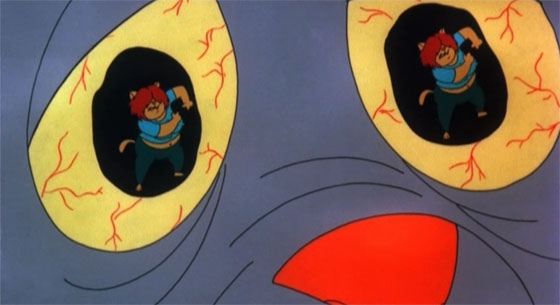 “The 1970’s. Jump back, baby.”
“The 1970’s. Jump back, baby.”
So here we have a bastard child of a bastard child. It’s a strange case, The Nine Lives of Fritz the Cat. Originally, of course, Fritz was created by R. Crumb, one of the signature characters populating his perpetually horny underground comix in the 1960’s. Fritz was young, aimless, restless, and always scheming to get into some hippie chick’s pants; he was R. Crumb, essentially. Terrytoons animator Ralph Bakshi met Crumb; they bonded over shared musical interests, and Bakshi convinced Crumb that he could pull off an adult animated film based on Fritz the Cat. (Before Crumb got cold feet – the whole complicated and tumultuous story is recounted in Jon M. Gibson & Chris McDonnell’s biography of Bakshi, Unfiltered.) The film got made – the first X-rated animated film – and was a huge hit on the grindhouse circuit; Crumb, who had nothing to do with the film, condemned the project. Baskhi’s career as an animator of adult-themed animated films was launched, and he proceeded to his most artistically successful film: Heavy Traffic, a raw, crazed, wrenching semi-autobiography. Steve Krantz, who worked with Bakshi on the 60’s Spider-Man animated series, produced both films, but also sought to capitalize on the tremendous financial success of Fritz. He wanted to make a sequel, but Bakshi had more original projects in mind, and declined to participate. So, somehow, The Nine Lives of Fritz the Cat exists, helmed by journeyman animation director Robert Taylor. Skip Hinnant returned to voice Fritz, this time older, married, and burned out.
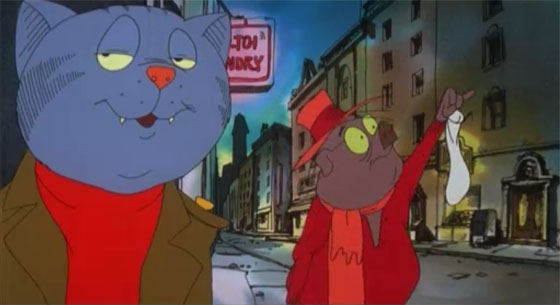 Say what you will about Fritz the Cat (1972), but for at least its first half, Bakshi did attempt to adapt R. Crumb. Eventually he lost the connection, and the second half is a meandering mess, but in the film’s early scenes we get a glimpse of R. Crumb’s style and characters on the big screen. Its sequel, further removed, is even more meandering and random, and frequently crude for crudity’s sake. This wouldn’t be such a problem if there were a few bright shining moments to make the thing memorable. Yet here is a 1970’s adult animated film that somehow manages to be inconsequential, and entirely forgettable. I watched it two weeks ago and I’m struggling to recall the details. (Okay, I imbibed a glass of brandy, but I swear that has nothing to do with it.) The premise is that Fritz, slumped upon the couch, smokes a joint and tunes out his nagging wife for nine separate daydreams. These unconnected vignettes resemble the style of underground comix in that they’re randomly offensive, randomly political.
Say what you will about Fritz the Cat (1972), but for at least its first half, Bakshi did attempt to adapt R. Crumb. Eventually he lost the connection, and the second half is a meandering mess, but in the film’s early scenes we get a glimpse of R. Crumb’s style and characters on the big screen. Its sequel, further removed, is even more meandering and random, and frequently crude for crudity’s sake. This wouldn’t be such a problem if there were a few bright shining moments to make the thing memorable. Yet here is a 1970’s adult animated film that somehow manages to be inconsequential, and entirely forgettable. I watched it two weeks ago and I’m struggling to recall the details. (Okay, I imbibed a glass of brandy, but I swear that has nothing to do with it.) The premise is that Fritz, slumped upon the couch, smokes a joint and tunes out his nagging wife for nine separate daydreams. These unconnected vignettes resemble the style of underground comix in that they’re randomly offensive, randomly political.
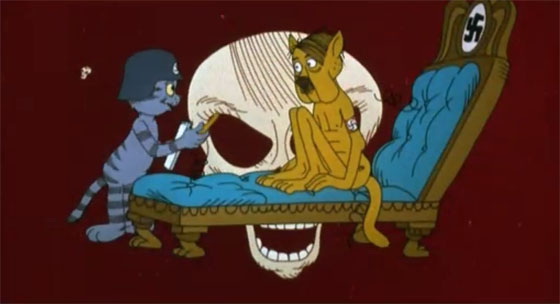 Unfortunately, none of it is really offensive, and if it’s political, it doesn’t actually say anything. This is best illustrated in a protracted scene in which Fritz encounters Adolf Hitler, who is naked, and has a single testicle (much is made of this). Eventually Adolf tries to sodomize Fritz, to Fritz’s understandable alarm. I have no idea what this scene means.
Unfortunately, none of it is really offensive, and if it’s political, it doesn’t actually say anything. This is best illustrated in a protracted scene in which Fritz encounters Adolf Hitler, who is naked, and has a single testicle (much is made of this). Eventually Adolf tries to sodomize Fritz, to Fritz’s understandable alarm. I have no idea what this scene means.
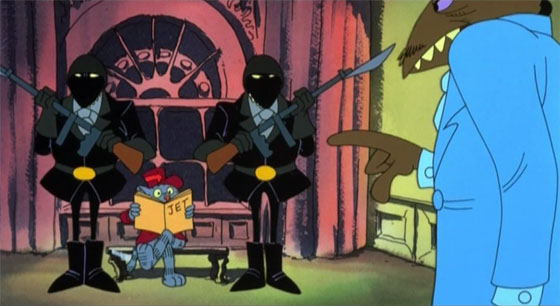 The animation is just fine. I was expecting a marked decline in quality with Bakshi’s absence, but Steve Kratz and Robert Taylor keep the production professional. There are one or two psychedelic montages in which the animators are finally allowed to cut loose, and if you’ve had a drink or two (again: stop looking at me), then it’s at least some nice eye candy. But they’re still pretty banal compared to similar scenes in Fritz, Heavy Traffic, or Coonskin. Bakshi’s not here, and it turns out that’s a problem. In nearly all of his films, he helps compensate for shortcomings (i.e. low budgets and cut corners) with a handful of dazzling sequences. In the original Fritz the Cat, I tend to think of the crow snapping his fingers to “Bo Diddley” while awaiting the arrival of the background painting, slowly approaching behind him. Or the overcrowded orgy scene in the bathtub (a lift from Crumb), balancing slapstick with satire. Nine Lives doesn’t have any centerpiece moment. One scene after another passes without much incident. Fritz becomes mired in the politics of “New Africa,” a newly-created country separated from the United States by a race war. He’s an astronaut banging a reporter. Nothing much sticks because nothing much happens – maybe, maybe the early scene in which he tries to talk a chick out of her clothes, if only because it’s the most Crumbian – using the guise of intellectualism toward lascivious ends.
The animation is just fine. I was expecting a marked decline in quality with Bakshi’s absence, but Steve Kratz and Robert Taylor keep the production professional. There are one or two psychedelic montages in which the animators are finally allowed to cut loose, and if you’ve had a drink or two (again: stop looking at me), then it’s at least some nice eye candy. But they’re still pretty banal compared to similar scenes in Fritz, Heavy Traffic, or Coonskin. Bakshi’s not here, and it turns out that’s a problem. In nearly all of his films, he helps compensate for shortcomings (i.e. low budgets and cut corners) with a handful of dazzling sequences. In the original Fritz the Cat, I tend to think of the crow snapping his fingers to “Bo Diddley” while awaiting the arrival of the background painting, slowly approaching behind him. Or the overcrowded orgy scene in the bathtub (a lift from Crumb), balancing slapstick with satire. Nine Lives doesn’t have any centerpiece moment. One scene after another passes without much incident. Fritz becomes mired in the politics of “New Africa,” a newly-created country separated from the United States by a race war. He’s an astronaut banging a reporter. Nothing much sticks because nothing much happens – maybe, maybe the early scene in which he tries to talk a chick out of her clothes, if only because it’s the most Crumbian – using the guise of intellectualism toward lascivious ends.
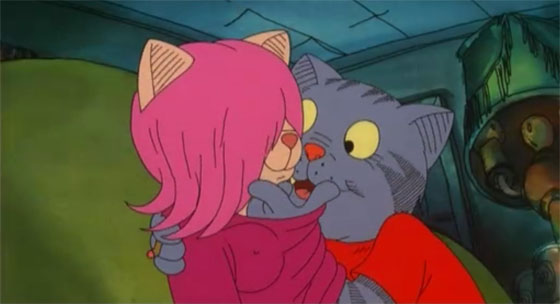 What’s especially peculiar is that it overtly imitates Bakshi’s style, which is something you don’t see very often, since R-rated animated films are so rare on these shores. From the semi-improvisational dialogue, to the mix of animation with live action stock footage, to the gritty street milieu, the film looks and feels like a Bakshi film…kinda. It lacks the soul he brings to his pictures.
What’s especially peculiar is that it overtly imitates Bakshi’s style, which is something you don’t see very often, since R-rated animated films are so rare on these shores. From the semi-improvisational dialogue, to the mix of animation with live action stock footage, to the gritty street milieu, the film looks and feels like a Bakshi film…kinda. It lacks the soul he brings to his pictures.
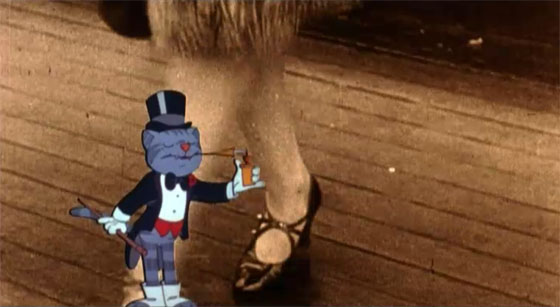 Fritz is a complete wreck here. The premise seems to be that the 60’s counterculture has crashed and burned as the new decade dawns. He’s married with kids. His dreams have died, and the picture ends not much further from where it began – Fritz is thrown out of the house, and he’s just as dazed, with a glassy stare. Credit to the film, I suppose, that it successfully captures that dreary, burned-out feeling, but it might just be that the filmmakers had run dry on imagination. And imagination is the last thing an animated film should lack.
Fritz is a complete wreck here. The premise seems to be that the 60’s counterculture has crashed and burned as the new decade dawns. He’s married with kids. His dreams have died, and the picture ends not much further from where it began – Fritz is thrown out of the house, and he’s just as dazed, with a glassy stare. Credit to the film, I suppose, that it successfully captures that dreary, burned-out feeling, but it might just be that the filmmakers had run dry on imagination. And imagination is the last thing an animated film should lack.









